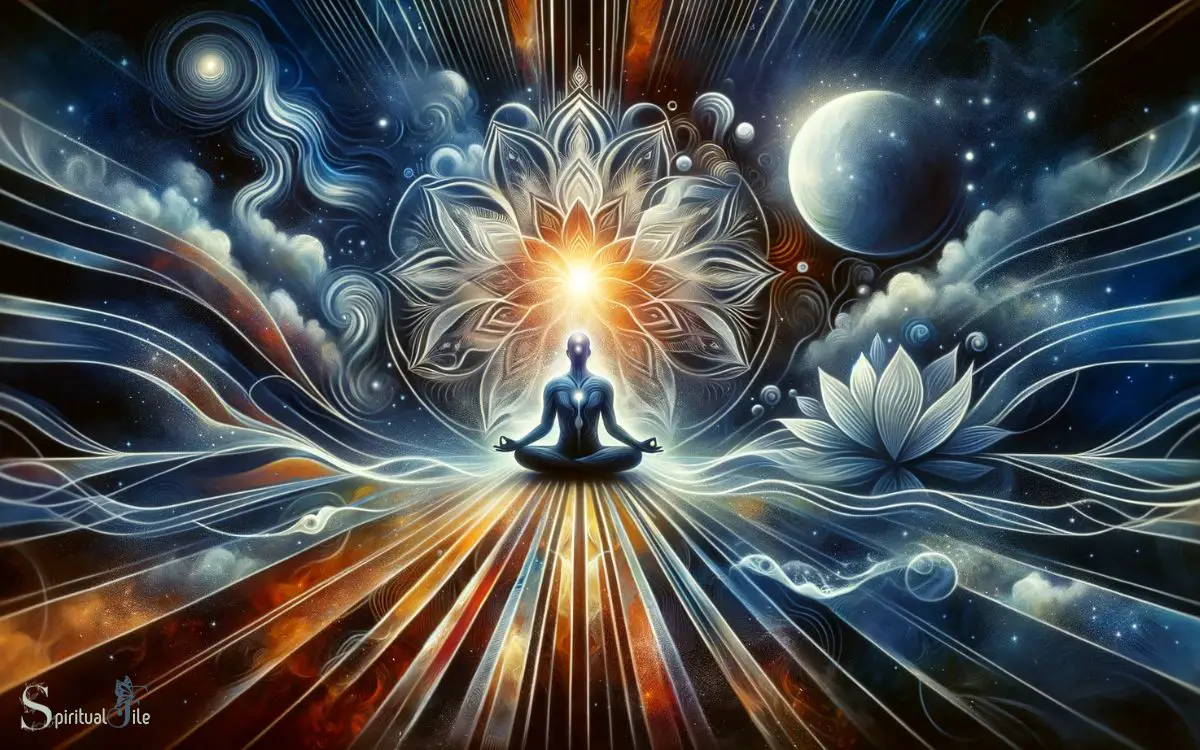Awareness Vs Consciousness Spirituality: Personal Growth!
In spirituality, awareness and consciousness are two critical concepts that are often discussed in relation to personal growth and enlightenment.
Awareness refers to the ability to perceive, feel, or be cognizant of events, while consciousness is the state of being aware of and responsive to one’s surroundings. Both play pivotal roles in spiritual practices and the journey toward self-discovery.
Awareness is often seen as the first step in the spiritual journey, as it involves recognizing the existence of something beyond our immediate sensory experiences.
Consciousness, on the other hand, encompasses the full experience of being aware, including the understanding of oneself and the universe.
In spirituality, cultivating a higher state of consciousness is frequently associated with reaching a deeper sense of enlightenment.

Key Takeaway
8 Aspects: Awareness Vs Consciousness Spiritualit
| Aspect | Awareness | Consciousness | Spirituality |
|---|---|---|---|
| Definition | The state of being conscious of something; recognizing and perceiving one’s surroundings or inner thoughts. | The state of being awake and aware; encompassing all mental activities, thoughts, and experiences. | A personal and often transcendent connection to a higher power or the divine, involving beliefs and practices. |
| Nature | It is a fundamental aspect of human cognition and perception, occurring in everyday life. | It is a broader and more encompassing aspect of human existence, including thoughts, emotions, and self-awareness. | It is a subjective and deeply personal belief system that often involves a sense of purpose, meaning, and connection to the divine or the universe. |
| Scope | Primarily relates to immediate sensory and mental experiences, such as seeing, hearing, or thinking. | Encompasses all mental processes, including self-awareness, emotions, and complex thought processes. | Extends beyond the individual and often involves beliefs about the nature of existence, the purpose of life, and the divine. |
| Scientific Study | Can be studied and understood through neuroscience, psychology, and cognitive science. | Is a subject of study in neuroscience and philosophy of mind, exploring the nature of subjective experience. | Often falls outside the scope of empirical science and is a matter of personal belief and experience. |
| Relationship to Self | Part of everyday self-awareness and perception of the world; it is a natural and constant aspect of human existence. | Encompasses self-awareness and the totality of conscious experience, including reflection and introspection. | Often involves a deeper self-awareness and may be a central aspect of personal identity and growth. |
| Connection to Spirituality | Typically not inherently linked to spirituality, but can be integrated into mindfulness or meditative practices. | May be explored in a philosophical or spiritual context as a component of the self and subjective experience. | Often a core element of spirituality, as it involves a sense of connection to something greater than the self, such as a higher power, the universe, or the divine. |
| Practices | Mindfulness, meditation, and introspection may be used to enhance awareness of the present moment. | Practices like meditation and self-reflection may deepen one’s understanding of consciousness. | Prayer, meditation, rituals, and other practices are often used to cultivate and explore spirituality. |
| Goal | Enhancing present-moment awareness and mindfulness; improving cognitive and emotional well-being. | Understanding the nature of consciousness and the self; exploring the boundaries of human experience. | Seeking a deeper connection to the divine, inner peace, purpose, and personal transformation. |
Defining Awareness and Consciousness

Awareness encompasses the perception of one’s surroundings, thoughts, and emotions. It involves being present in the current moment and acknowledging the existence of oneself and the environment.
On the other hand, consciousness delves deeper into the understanding of the self, the interconnectedness of all beings, and the recognition of higher truths. It involves an elevated state of awareness that transcends the physical realm and taps into the spiritual plane.
While awareness is more focused on immediate sensory experiences, consciousness expands beyond the present moment and delves into the realms of enlightenment and transcendence.
Both awareness and consciousness are essential components of spiritual growth and mental evolution, guiding individuals towards a deeper understanding of themselves and the universe.
The Role of Awareness in Spirituality

Engaging in the cultivation of awareness is integral to the spiritual journey, fostering a deepened understanding of the self and the interconnectedness of all existence.
Through awareness, individuals can transcend the limitations of ego and connect with their inner being, leading to a heightened sense of compassion, empathy, and inner peace.
The following table illustrates the key aspects of awareness in spirituality:
| Aspects of Awareness | Description |
|---|---|
| Self-awareness | Understanding one’s thoughts, emotions, and behaviors. |
| Interconnectedness | Recognizing the unity and interdependence of all living beings. |
| Mindfulness | Cultivating a present-moment, non-judgmental awareness. |
| Compassion | Developing empathy and kindness towards oneself and others. |
| Conscious living | Making intentional choices aligned with spiritual values. |
The Role of Consciousness in Spirituality

The role of consciousness in spirituality is fundamental to understanding the nature of self-awareness and the interconnectedness of all existence.
Consciousness in spirituality refers to the state of being awake and aware of one’s surroundings, but it also extends to a deeper level of awareness of the self, others, and the universe.
In spiritual practices, consciousness is often associated with the idea of higher consciousness or expanded awareness, which transcends the individual ego and connects with the universal consciousness.
This elevated state of consciousness is believed to bring about a profound sense of interconnectedness, compassion, and understanding of the underlying unity of all existence.
Cultivating consciousness in spirituality involves practices such as meditation, mindfulness, and self-reflection, which can lead to a deeper understanding of the self and the world around us. This understanding is essential for cultivating awareness in daily life.
Cultivating Awareness in Daily Life

Cultivating awareness in daily life requires consistent practice and a commitment to mindfulness. It involves being fully present in each moment, observing thoughts and emotions without judgment, and maintaining a deep connection with the present experience.
One way to cultivate awareness is through mindfulness meditation, which allows individuals to develop a non-reactive awareness of their internal and external experiences. Additionally, practicing gratitude and self-reflection can help individuals become more aware of their thoughts, feelings, and behaviors.
Engaging in activities that promote self-awareness, such as journaling, yoga, or spending time in nature, can also contribute to the development of mindfulness in daily life.
Cultivating Consciousness in Daily Life

In cultivating consciousness in daily life, individuals must strive to maintain a deep connection with their present experiences, developing a heightened awareness of their thoughts, emotions, and behaviors.
This involves actively observing the patterns of the mind, acknowledging emotions without judgment, and being fully present in each moment.
By practicing mindfulness and self-reflection, individuals can cultivate a deeper understanding of themselves and their interactions with the world around them.
Cultivating consciousness in daily life is a continuous process that requires patience and dedication, but it can lead to greater clarity, compassion, and purpose.
Transitioning into the subsequent section about ‘awareness and consciousness in meditation’, it becomes evident that meditation serves as a powerful tool for honing these skills and integrating them into daily life.
Awareness and Consciousness in Meditation

When practicing meditation, individuals can deepen their awareness and consciousness through focused attention and introspection.
Meditation serves as a powerful tool for developing heightened awareness by encouraging individuals to be fully present in the moment.
By directing attention to the breath, bodily sensations, or a specific focal point, practitioners can cultivate a heightened state of awareness.
This focused attention allows individuals to observe their thoughts and emotions without judgment, leading to a deeper understanding of their inner workings.
How Does Spiritual Energy Impact Personal Growth and Awareness?
Spiritual vs physical energy plays a significant role in personal growth and awareness. While physical energy helps in sustaining daily activities, spiritual energy influences mental and emotional well-being, leading to greater self-awareness and connection with others. Balancing both forms of energy can result in a more harmonious and fulfilling life.
Integrating Awareness and Consciousness

Integrating awareness and consciousness involves actively practicing mindfulness and fostering a deep understanding of the interconnectedness of thoughts, emotions, and the present moment.
This integration requires acknowledging the constant interplay between our conscious thoughts and the underlying awareness that perceives them.
By cultivating mindfulness, individuals can observe their thoughts and emotions without judgment, allowing for a heightened state of consciousness.
This process enables individuals to break free from habitual thought patterns and emotional reactivity, leading to a greater sense of presence and clarity.
Integrating awareness and consciousness also involves recognizing the unity of all beings and phenomena, transcending the limitations of the individual self.
Through this integration, individuals can experience a profound shift in their perception of reality, fostering a deeper connection with themselves and the world around them.
Conclusion
The integration of awareness and consciousness is essential in spirituality. Cultivating mindfulness and deepening one’s understanding of the self and the world around them is crucial for spiritual growth.
The idiom ‘seeing the bigger picture’ emphasizes the importance of gaining a broader perspective and heightened awareness in spiritual practice.
By actively developing both awareness and consciousness in daily life and meditation, individuals can enhance their spiritual journey and achieve a greater sense of peace and fulfillment.






